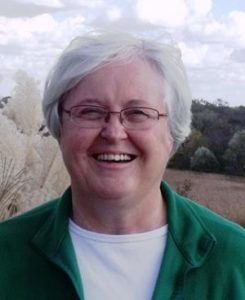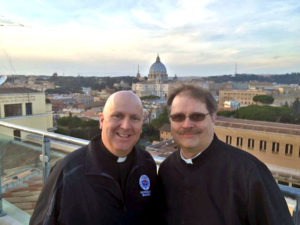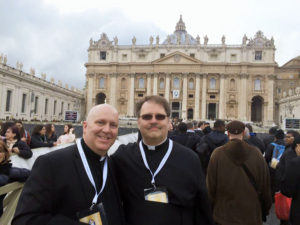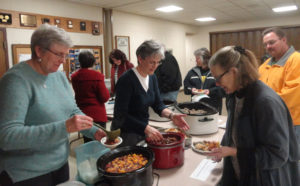Three parishes combine resources to practice works of mercy
By Lindsay Steele
The Catholic Messenger
The cluster parishes in Wellman, Riverside and Richmond have come together to celebrate the Year of Mercy through a variety of service projects, including feeding the hungry and making blankets for persons in need.
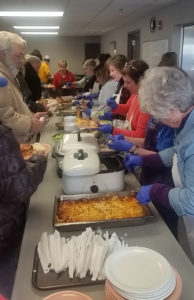
Members of the cluster parishes in Wellman, Riverside and Richmond serve food at Iowa City’s Free Lunch Program Feb. 9. It’s one of several corporal works of mercy the cluster is practicing during the Year of Mercy.
“We wanted to emphasize the corporal works of mercy and tie them into the activities we would be doing throughout the year,” said Deacon Derick Cranston, deacon for the parishes.
At the beginning of the Year of Mercy, which Pope Francis opened Dec. 8, the parishes formed a Year of Mercy committee and brainstormed ideas. The first official project was selling CRS Fair Trade coffee and chocolate to support small farmer co-ops in impoverished countries. Deacon Cranston said this project offered an opportunity to practice the corporal work of giving alms to the poor.
The projects have continued during the Lenten season. Last month, about 15 members of the cluster parishes served food at Iowa City’s Free Lunch Program (FLP). FLP serves lunch six days a week, relying on volunteer teams to prepare and serve nutritious meals using their own food or food from local restaurants, grocery stores, a food distributor or from the Free Lunch pantry where items are obtained through the HACAP Food Reservoir.
Cluster volunteers from age 19 to 70 prepped and served the FLP meal Feb. 9. Parishioners unable to volunteer in person donated food and money to the project.
Sandy Marner of Holy Trinity Parish-Richmond led the cluster’s participation in the project. “Personally I found the experience so uplifting! I sat down and ate lunch with three nice men and we had such a nice conversation. They asked lots of questions and we shared stories. FLP encourages the volunteers to eat lunch with the guests so it feels like a home-like atmosphere.”
The cluster plans to return to FLP in June. They join St. Mary, St. Wenceslaus and St. Patrick parishes in Iowa City; St. Joseph Parish-Hills, St. Thomas More Parish-Coralville and St. Mary Parish-Solon as Catholic entities offering regular support to the program.
Last month, the three cluster parishes began making and collecting blankets for homeless veterans and other in-need individuals as a way to demonstrate the corporal work of clothing the naked. Deacon Cranston said the parish got the religious education students involved with the project by having them bring used blankets from home and make tie blankets in class. “This was a good opportunity to catechize our kids. … Young kids are more apt to learn when there is something tangible they can do and be a part of.” So far, the parish has donated 60 blankets. They will continue donating and making blankets in March.
Future corporal works of mercy projects include making May Day baskets and delivering them to nursing homes and homebound individuals (visiting the sick); hosting a food drive (feeding the hungry, giving water to the thirsty); hosting a Christmas in July toy drive (giving alms to the poor); making gift baskets for the homebound (visiting the sick); and making care packages for college kids, military personnel and individuals in jail (visiting the prisoner).
Deacon Cranston said through the Year of Mercy projects the cluster will have covered six of the seven corporal works of mercy. “It’s truly a cluster-wide effort, as members of all three parishes offer to volunteer.”








